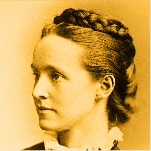Millicent Garrett Fawcett was a British writer and political worker. She was born at Aldeburgh, Suffolk, June 11 1847, the seventh child of Mr. Newson Garrett. In 1867 she married the economist Henry Fawcett, subsequently Postmaster-General, and during her husband’s life was closely associated with him in all his work, his blindness making him in many ways extremely dependent upon her. She herself produced various works on economics, including
Political Economy for Beginners (1870),
Tales in Political Economy (1875), and, with her husband, a volume of
Essays and Lectures (1872).
Mrs. Fawcett had for many years been interested in the higher education of women and in their economic and political future, and was one of the early workers for women’s suffrage, becoming more prominent in the cause after her husband’s death (1884). By about 1870 various small societies had grown up with the purpose of advancing the cause of women’s suffrage, and in 1896 these were amalgamated under the name of the National Union of Women’s Suffrage Societies, Mrs. Fawcett in 1907 becoming the president of this movement. The body was for some years the only important suffrage society, and most of the pioneers of the movement belonged to it; but in 1906 the Women’s Social and Political Union was formed, pledged to work by militant, as opposed to constitutional methods. Mrs. Fawcett was strongly opposed to the tactics of the militant suffragists, and expressly dissociated the N.U.W.S.S. from any sympathy with such methods. The constitutional methods adopted by the body of which she was president included an alliance formed with the Labour party (1912) by which the society agreed to support Labour candidates in preference to Liberal when the latter proved unsatisfactory on the suffrage question.
Mrs. Fawcett in 1912 produced her work
Women’s Suffrage, and her other books include
Lives of
Queen Victoria (1895) and
Sir William Molesworth (1901), and
Five Famous French Women (1906).
Mrs. Fawcett’s only child, Miss Philippa Garrett Fawcett, had a distinguished career at Newnham College, Cambridge, where in 1890 she was bracketed equal to senior wrangler. She became in 1905 principal assistant in the Education Officer’s department of the L.C.C.
A Biography from Encyclopædia Britannica, 1922


